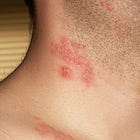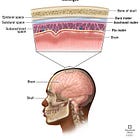The role of HHV reactivation in everything going on...
A brief summary, and some things to consider.
Prior posts for those interested:
Using the prior information regarding HHV reactivation this post is intended to provide a broad summary and some questions worth asking in regards to the link between HHV reactivation and some of the signs/symptoms seen with SARS-COV2 and the COVID vaccines. A lot of this information may appear redundant, but I find that it helps to at least organize my thoughts.

The prior posts examining HHV reactivation aren’t intended to provide a clear explanation for everything going on, but rather something worth considering as a possible explanation for some of these instances of severe SARS-COV2 and vaccine adverse reactions.
Consider the fact that HHV reactivation has been closely associated with chronic fatigue syndrome and other post-viral syndromes. In the era of COVID it may not be that Long COVID is due entirely to SARS-COV2, but may be due in part to HHV-reactivation. However, in a SARS-COV2 only era of medicine many clinicians may not consider this possibility, in which case many reports of Long COVID and severe COVID illness may not take into account the role that HHV reactivation plays in outcomes.
While people reported cutaneous symptoms of VZV reactivation following COVID vaccination, there were also many reports of people feeling fatigued, having headaches, and other neurological symptoms that may have gone away in due time. Albeit transient for some individuals, this itself raises a question as to whether these instances may not be completely spike or vaccine-related, but rather signs of HHV reactivation as well, which may not present with rashes or skin lesions but otherwise present as alterations in mental state.
It’s also important to note that HHV reactivation can be caused by a host of factors, and has been reported several times within the literature to be associated with other vaccines, and even severe illness of other sorts such as sepsis. Even hospitalization itself can lead to an increased risk of HHV viremia.
Given this fact there’s a clear question of whether the HHV reactivation seen following SARS-COV2 illness and vaccination are occurring at higher rates relative to reports for other illnesses and vaccines.
The explanation for this possibility of higher prevalence in the COVID era hasn’t been fully elucidated. As mentioned previously, some of the explanations provided include some of the following:
SARS-COV2’s possible lymphotropism may lead to lymphocyte exhaustion, allowing for HHVs to reactivate unabated. In fact, the lymphotropism shown by some HHVs may suggest that a synergistic mechanism of lymphocyte exhaustion may be occurring for some cases of severe SARS-COV2 infections.
There’s been some suggestions that synergism between certain HHVs and SARS-COV2 may be occurring as well. In this case, gene expression for ACEII and other surface proteins may be enhanced by HHVs which may allow for greater viral entry of SARS-COV2.
In some instances of SARS-COV2 infection and vaccination autoantibodies against antimicrobial agents such as interferons may dampen the innate immune repose, thus also providing a window of opportunity for infection.
A SARS-COV2 infection, as well as vaccination, may also direct the immune response to target the virus and spike protein, possibly leaving another window of opportunity for HHV reactivation. Note that this argument is not an OAS argument.
Given stress’ propensity to induce HSV reactivation, it’s quite possible that HHV reactivation is more likely during the COVID era due to the widespread stress and anxiety many people experienced due to the lockdowns and mandates. This aspect doesn’t appear to be explored, although I wouldn’t be surprised if there was some association. If evidence arises, this again would suggest a serious flaw in the lockdown/mandates being enforced.
COVID hospital protocols have been under serious scrutiny as being both ineffective and possibly even being deadly. Given the increased risk of HHV reactivation in a hospital setting there’s a question of whether COVID hospital protocols may have been associated with increased HHV reactivation. Consider that corticosteroid use may be associated with HHV reactivation. Widespread use of Dexamethasone may have played some part in HHV reactivation. However, the association between corticosteroid use and HHV reactivation has remained controversial. Also, note that the clear association between HHV reactivation and worse outcomes has not been clearly established.
In regards to the vaccines several of the vaccine platforms appear to show evidence of HHV reactivation. Again, the question remains which ones show greater prevalence and why. The evidence so far suggests a bias towards the mRNA platforms, especially with Pfizer/BioNTech. However, this comes with the caveat that Pfizer/BioNTech’s vaccine was the most widely available vaccine for many countries, and so higher rates of HHV reactivation following the use of this vaccine may boil down to a numbers game.
Nonetheless, the explanation here may lie in the cytotoxicity of the spike as nearly all platforms are intended to induce spike presentation in some way. There’s also the fact that directed immune responses towards the vaccines may also leave openings for HHV reactivation.
However, there’s also a possibility that adjuvants and other immunomodulating agents may alter the native immune response, thus allowing the a window for reactivation.
The latter doesn’t appeared to be explored, and the former two arguments are in-line with what may be happening with SARS-COV2 infections, providing a possible overlap in models.
As of now the reasons for the prevalence of myocarditis following SARS-COV2 infection and vaccination are still up in the air. However, as mentioned in previous articles, viral myocarditis is considered to be one of the main causes of cardiovascular events and even sudden cardiac death, given that some endomyocardial biopsies in those with heart failure and other heart issues tend to show the presence of HHV DNA.
Keep in mind that HHV detection in some of these cases may be due to the bystander effect, in which case the compromised state of the heart allows for HHV reactivation rather than the other way around (i.e. that HHV reactivation leads to heart damage and failure).
Nonetheless, the role of HHV reactivation within the heart of some SARS-COV2 and vaccine patients is worth considering, and may provide another overlooked model as many clinicians or pathologists may focus on spike or SARS-COV2-derived heart damage.
Consider, overall, that many of the signs/symptoms of SARS-COV2 infections such as myocarditis, neurological issues such as headaches and fatigue, Long COVID, and even some adverse reactions following COVID vaccination overlap with symptoms of HHV reactivation.
Unfortunately, reports continue to miss out on pertinent information. It may be worth it for researchers and clinicians to consider HHV reactivation in biopsies of myocarditis patients, as well as some post-mortem patients. Antibody titers against HHVs should also be considered for those who experience adverse reactions following COVID vaccination.
All of this may prove to amount to nothing in the end, but more answers and investigations is better than the limited number of investigations that are occurring right now.
A suggested article on the lack of key information:
Substack is my main source of income and all support helps to support me in my daily life. If you enjoyed this post and other works please consider supporting me through a paid Substack subscription or through my Ko-fi. Any bit helps, and it encourages independent creators and journalists such as myself to provide work outside of the mainstream narrative.







